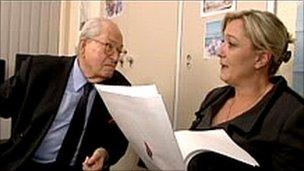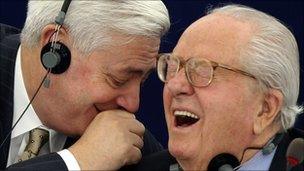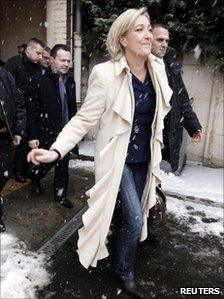French rightists mull dynastic succession for Le Pen
- Published

Jean-Marie Le Pen supports his daughter's bid to take over the Front National
For 40 years Jean-Marie Le Pen has ruled one of the most successful and feared ultra-nationalist movements in Europe.
In 2002 he shocked France by winning through to the second round of the presidential election.
But now at 82 years of age, the father of the Front National is ready to step aside and he is backing his daughter Marine to succeed him.
"I didn't take to politics readily," Marine told me. "But then as the daughter of Le Pen, it is probably unavoidable that I entered the fray. Politics swallowed me up."
"Now it is my desire to carry on my father's fight," she says. "I want to strive for what he believed in, what the French people really want. And if I don't do it, I don't think anyone else is capable."
Softer image
Marine is not lacking in self-confidence. But she is hardly Joan of Arc, the symbol of French sanctity that is the adopted emblem of the FN party.
Invariably she wears jeans and high-heeled shoes. She is a twice-divorced mother of three. She is pro-abortion. She is certainly not the choice of the hard-line Catholics within her party.
But those who meet her agree she is personable and difficult to dislike. Which makes her a formidable politician.
"She is of her generation," said Nonna Mayer, an expert on far-right politics at the Sciences Po University. "She has no nostalgia for World War II. That is the past. She is looking ahead."
"She has the same ideas about immigration as her father," said Ms Mayer. "She thinks there are two kinds of French people: the 'real French' and the others. But she packages this message in a different, softer way. She is very popular and very good with the media."
The vote for the party leader will be taken among 75,000 party members. The result is to be announced at a conference in Tours on 16 January.
The old guard
But there is someone who stands in Marine's way: Bruno Gollnisch.
For years he has been the right-hand man of Jean-Marie Le Pen and was briefly the leader of a far-right group within the European Parliament. He is seen as the old guard, though on the key policy of immigration, he and Marine are pretty much the same.
"Our policy is to stop and if possible reverse, firmly but peacefully, the trend of massive immigration in our country. We are also in favour of national preference. We think it is quite normal that French people be preferred to 'aliens' in terms of employment, education and so on."
The feminists and some traditionalists within the party prefer Mr Gollnisch. Marine could split the party. But her father thinks she is best placed to achieve the unthinkable.
"The National Front is not an association of bowls players, it isn't a basketball club, it's a political organisation with heavy responsibilities," said Mr Le Pen.
He joked and laughed with his daughter throughout our interview. They are clearly very close.

Bruno Gollnisch has been Mr Le Pen's right-hand man for years
"I've made it clear who I support," he says. "If you will allow me a comparison. Bruno Gollnisch is an Olympic swimming champion but what we need is a Formula One driver; that is not to take his qualities away, Bruno Gollnisch is good at swimming but he is not so good at driving."
Ambitious goals
The nightmare scenario for opponents of the FN within France, and Europe at large, is that one of these two candidates will see off a deeply unpopular President Sarkozy and progress to round two of the Presidential elections in 2012.
When Mr Le Pen forced his way through to the second round in 2002, centre-left voters held their noses and voted for the incumbent Jacques Chirac of the centre-right.
But, faced with a similar scenario, would the centre-right voters opt for a socialist candidate? Marine Le Pen does not think they would.
For years, there were many within the Front National who were quite content to belong to a fringe party. Marine has bigger goals in mind.
And she firmly believes the political tide in Europe is moving her way.
"I am in it to win, to win the presidential elections." said Marine. "That's the goal of any political party, to come to power to implement its ideas. So we will fight. And I think we stand a good chance of reaching the second round. It is why the French political class is so fidgety."
"We might well face a socialist candidate," she says. "I hope so. The voting reactions between the right and the left are not the same. Moreover, the image of the Front National has changed in the minds of the French people in the past ten years. The numbers prove it."

Marine Le Pen believes she could win the presidential election
Dangerous opponent
But has the image of Marine Le Pen changed in the minds of the French people?
Last month the mask slipped. During a campaign speech in Lyon, she compared Muslims who pray in the street to the Nazi occupiers of France during the Second World War.
"In the second round, I am sure there would be a sacred union against Marine Le Pen," said Nonna Mayer. "She is still perceived by the majority of French voters as the re-incarnation of the extreme right. And still the FN is seen by over half of the French voters as a danger to democracy."
And yet a recent poll suggested Marine could come third in the 2012 Presidential elections, with 13% of the vote.
It might not seem a very large proportion of the vote but that is five points better than her father was polling a year from the election in 2002.
With President Sarkozy floundering and the French centre-left still muddled, Marine Le Pen could be a very dangerous opponent.
- Published14 August 2010